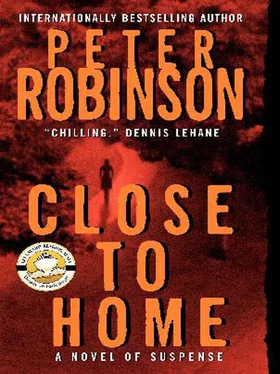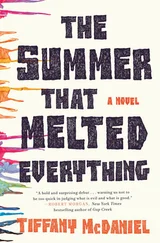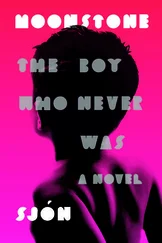“Heavens, no! Why would anyone do that?”
“Why, indeed?” said Michelle. “And you know nothing about any unsavory company Graham might have been keeping – perhaps on these occasions when he stayed out late or was gone all day?”
“No. He was with his friends. I don’t understand what you’re trying to say.”
“It’s all right,” said Michelle. “I’m not sure that I understand it myself. I suppose all I really want to ask is whether Graham had any friends you disliked, or spent time with anyone you didn’t approve of.”
“Oh. No. They were all just regular lads. We knew their mums and dads. They were just like us.”
“No older boys? No one you thought was a bad influence?”
“No.”
“And Graham never seemed to have more money than you expected him to have?”
Mrs. Marshall’s expression sharpened and Michelle knew she’d gone too far. She also knew that she had touched a raw nerve.
“Are you suggesting our Graham was a thief?”
“Of course not,” Michelle backtracked. “I just wondered if he maybe did other odd jobs he didn’t tell you about, other than the paper round, perhaps when he should have been at school.”
Mrs. Marshall still eyed her suspiciously. Bill Marshall seemed to be taking everything in, his beady eyes moving from one to the other as they spoke, but they were the only things moving in his face. If only he could talk, Michelle thought. And then she realized that would be no use. He wouldn’t tell her anything.
“I suppose it’s just a mark of my frustration with the case,” Michelle admitted. “After all, it was so long ago.”
“Jet Harris always said it was them Moors Murderers, the ones who were tried the year after. He said we’d all probably have nightmares for the rest of our lives if we ever knew how many young lives they’d taken and where the bodies were buried.”
“He told you that, did he?” said Michelle. How very convenient. She was fast coming to the conclusion – or reaffirming what she had suspected earlier – that Detective Superintendent Harris had run the case with blinkers on, and Mrs. Marshall, like so many mothers, hadn’t a clue what her son was up to most of the time. She wondered if his father knew. Bill Marshall’s lopsided face gave away nothing, but Michelle fancied she could see wariness in his eyes. And something else. She couldn’t say with any certainty that it was guilt, but it looked like that to her. Michelle took a deep breath and plunged in.
“I understand your husband used to work for the Kray twins back in London.”
There was a short silence, then Mrs. Marshall said, “Bill didn’t work for them, as such. He used to spar with them down the gym. We knew them. Of course we did. We grew up in the same neighborhood. Everybody knew Reggie and Ronnie. Always polite to me, they were, no matter what anybody says about them, and I’ve heard some stories as would make your hair curl. But they were basically good lads. People don’t like it when others get a bit above their station, you know.”
Michelle could feel her jaw dropping. There was nothing more to be gained here, she realized, and if she was going to solve this case she was going to do so without the family’s help, and without Ben Shaw’s. And perhaps in peril of her life. “Remember Melissa. You could join her…” Promising again that she would be at the funeral, Michelle excused herself and hurried off.
That evening at home, Banks glanced through the evening paper over a Madras curry he’d bought earlier at Marks and Spencers, slipped Bill Evans’s Paris Concert into the CD player, poured himself a couple of fingers of Laphroaig and flopped down on the sofa with his 1965 Photoplay diary. He thought it was Oscar Wilde who had said, “I never travel without my diary. One should always have something sensational to read on the train,” but he could have been wrong. It was easy to attribute just about any witty saying to Oscar Wilde or Groucho Marx. Curious, though, he stirred himself and checked the Oxford Dictionary of Quotations and found that he was right this time.
Banks’s diary was far from sensational. As he flipped the pages once again, glancing at the pretty actresses he hardly remembered – Carol Lynley, Jill St. John, Yvette Mimieux – he was struck by how many records he had bought and films he had seen. Until, just a couple of weeks from Graham’s disappearance, Banks saw that his diary did, in fact, have its moments, and as he read the trivial or cryptic entries, he was able to fill in the rest with his memory and imagination.
For the first two weeks of August 1965, the Banks family had been on their annual holidays. There was nothing unusual in that; they went every year at the same time, his father’s annual factory shut-down fortnight. What was unusual that year was that they went to Blackpool – much further afield than their usual trip to Great Yarmouth or Skegness – and that they took Graham Marshall with them.
At fourteen, Banks was of an age when he found wandering around a seaside resort with his parents embarrassing, and riding the donkey on the beach or playing with a bucket and spade no longer held any appeal. As Graham’s dad had just started on a large building project – his work being far more seasonal than Arthur Banks’s – and it didn’t look as if the Marshalls would get a holiday that year, financial arrangements were made and Graham was allowed to accompany them.
Visit Blackpool! See the Famous Tower! Hear Reginald Dixon at the Mighty Organ! See the glorious Golden Mile! Go to a star-studded Variety Show on one of the Three Piers! Have hours of Family Fun at the Pleasure Beach!
It might as well have been the moon.
At some ridiculously early hour in the morning, because that was when they always set off on holiday, they would have piled their cases into the back of Arthur Banks’s Morris Traveller, a popular sort of estate car with a wood-frame rear, and headed north on their long journey, no doubt arriving tired and cranky, but in good time for tea, at Mrs. Barraclough’s boarding house. Bed, breakfast and evening meal at six o’clock on the dot, and woe betide you if you were late. Mrs. Barraclough was a large, forbidding presence, whom Banks remembered even now as dressed in a pinny, standing with her thick legs apart and her arms folded under her massive bosom.
Banks saw that he had recorded the weather every day at the top of his entry, and as holidays went, they had done quite well: nine days of at least partial sunshine out of fourteen, and only two and a half complete washouts. On the rainy days, Banks and Graham had hung about the amusement arcades on the Golden Mile, he noted, or on one of the piers, and played the one-armed bandits and pinball machines. One rainy Sunday afternoon they spent watching the old war films that always seemed to be showing on rainy Sunday afternoons, patriotic films with titles such as The Day Will Dawn, In Which We Serve and Went the Day Well?
On overcast days they would wander the prom, eating fish and chips from newspapers or boiled shrimp from paper bags and go hunting through the town’s few secondhand bookshops, Banks looking for Sexton Blake novelettes (he had bought one called The Mind Killers ) or Ian Fleming novels, while Graham went after Famous Monsters magazines and Isaac Asimov stories.
One night they all went to the Tower Circus, and Banks noted in his diary that he found Charlie Cairoli’s act “very funny.” They also took in a variety show on the North Pier, with Morecambe and Wise providing the comedy and The Hollies the music.
But most evenings after tea they spent watching television in the guests’ lounge. The TV was an old model, even for then, with a small screen, Banks remembered, and you turned it on by opening a sprung flap on the top, under which were the volume and contrast controls. Banks hadn’t recorded it in his diary, but no doubt there would have been some adult wanting to watch Sunday Night at the London Palladium instead of Perry Mason, which was only to be expected of adults. Luckily, Roy was sleeping on a camp bed in his parents’ room, so Banks and Graham would just go up to their room and read, listen to Radio Luxembourg on their transistors, or pore over the dirty magazines Graham seemed to get hold of in abundance.
Читать дальше












